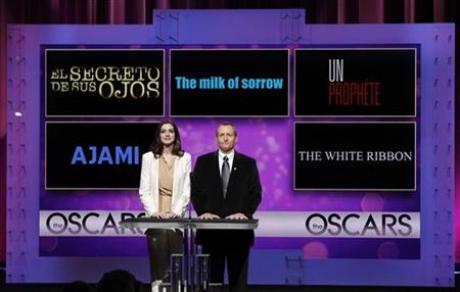


JAFFA, Israel - When the directors yelled "Action!" on the set of Israeli film "Ajami," none of the actors had prepared lines or knew exactly what was expected in their scenes.
Most of them had day jobs and never appeared in a movie before. None knew how the low-budget drama would end. And no one imagined it would earn a nomination for best foreign language film at the Academy Awards on March 7.
Co-directed by a Jew and a Christian Arab, "Ajami" was shot in a relatively brief 23 days in the mostly Arab district of the same name in Jaffa, which has a reputation for poverty and violence and is part of greater Tel Aviv.
The movie's raw, cinema-verite look at life provides an about-face from Israel's stylized 20O9 Oscar nominee, "Waltz With Bashir," which used experimental animation to explore the inner conflict of a veteran of the 1982 Lebanon invasion.
But the two share a common lineage to a re-energized Israeli movie industry being fueled by a new generation of storytellers.
"Ajami's" intertwined stories expose an Israeli underclass riven by drugs, crime and ethnic prejudice.
The movie follows a young Muslim who gets caught in an Arab clan feud and his own forbidden romance with a Christian woman; the story of a Jewish police officer in search of his missing soldier brother, and the tale of a Palestinian youth who sneaks into Israel for menial work.
"To a certain extent, you have to take into account the whole notion of politically correct, but at the same time we didn't want to beautify reality," said Yaron Shani, who worked on the movie for seven years with co-director Scandar Copti.
Their strategy was to find first-time actors who shared similar backgrounds with the characters and who would infuse the roles with real-life experience. Casting calls were posted around Ajami and relayed among residents via word of mouth.
KEEPING IT REAL
Most scenes were shot in one take, using multiple cameras to preserve the sense of spontaneity. The dialogue is mainly in a gritty urban Arabic, peppered with Hebrew. Half of the $1 million budget was raised in Germany, the rest in Israel.
Shahir Kabaha, 25, who still works at his family's local bakery, was cast as the protagonist after being brought by a friend to an acting workshop without knowing it was for a film. While the script was kept secret to add to the real-life feel of the movie, preparations were intense and long.
"It started out with a few months of talking to an empty chair," he said, jokingly. "And just learning to open up in front of the camera."
For another lead character, a policeman, they recruited Eran Naim, a 16-year Israeli police veteran with no background in acting. He even played the father of his own children.
"The directors didn't tell us if what we were doing was wrong," said Naim, 39, who in one scene is assaulted by a group of Arabs while trying to arrest their neighborhood drug dealer. "I acted as if at work, and did what I felt."
Top Israeli film critic Nachman Ingber said "Ajami," "Waltz with Bashir" and 2007 Oscar nominee "Beaufort" are products of a re-energized local industry that emerged in the past decade on the backs of a younger Israelis who for the first time studied filmmaking as an art form in its own right.
Isaac Zablocki, director of the Israel Film Center in New York, said: "Israel's film industry supports young Arab and Jewish talent even with unconventional films, bringing social issues to the surface. It's a sign of a healthy democracy and one of the few ways to raise awareness and create change."
Also competing for best foreign language film at the Oscars are Peru's "The Milk of Sorrow" ("La Teta Asustada"), French film "A Prophet" (Un Prophete), Argentina's "The Secret In Their Eyes" (El Secreto de Sus Ojos), and German movie "The White Ribbon" (Das Weisse Band).